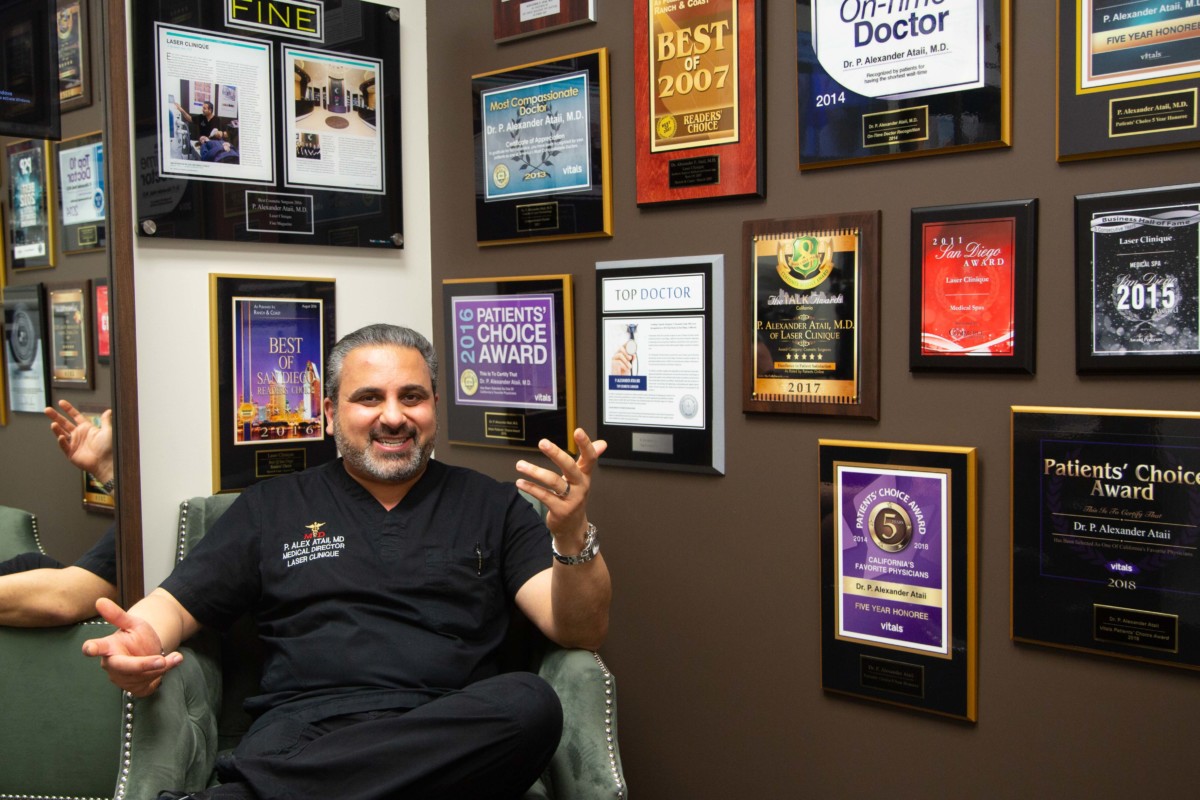In honor of National Mediterranean Diet Month, Luna Grill’s marketing team is sitting down with professionals in the health, wellness and fitness industries to talk about best practices and client/patient recommendations. We are so honored to have had the opportunity to sit down with P. Alexander Ataii M.D. who is the Medical Director and Founder of Laser Clinique in San Diego, CA. Dr. Ataii is a skilled skin care specialist who focuses on all aspects of the skin both diagnostic and cosmetic. We loved hearing his input on how health and wellness can not only impact the skin, but also your daily life! See our full Q&A with Alex below.

Tell us about yourself.
My name is Dr. P. Alexander Ataii. I am a Cosmetic Surgeon in San Diego. I’ve been practicing non-invasive or minimally invasive cosmetic enhancements for the past 14 years.
Why do you love what you do?
I love what I do! That’s why I show up 6 days a week, much to my wife’s dismay. The idea behind cosmetic enhancement is that you look at the well-being of the individual and discuss how it’s more about the internal health that helps enhance external treatments. It’s not just about what they see on the exterior; what we perceive on the exterior starts internally. Health, nutrition, lifestyle and sun exposure all play a factor when it comes to your skin and we emphasize this to every patient that walks through our door.
What words do you live by?
My professional motto is, “see one, do one and teach one.” As a personal motto, I believe that if you wake up every morning with a positive attitude it will set the tone for the rest of your day.
In your opinion, what makes the Mediterranean Diet so heart healthy?
In San Diego specifically, we see a vast number of individuals in my practice that are very passionate about fitness and health, so we try to guide them towards the appropriate way of their health and diet. This is something that I personally engaged in myself. I struggled with weight when I was younger, so it took me awhile to figure out what type of diet works for me. I’ve tried them all – I did Paleo for awhile, I tried Keto. A regular diet can produce inflammation in the body which can lead to other ailments. I support the Mediterranean Diet because it has been proven to be an effective anti-inflammatory diet.
At a very young age I had to undergo a hip replacement which was a surprise to me and many specialists. It took me a long time to figure out what was going on with my body, for a long time I thought I had knee problems because of running on an elliptical. After visiting many doctors and reviewing the MRI scans, it was determined that I needed a hip replacement at the age of 43. I believe that part of it was due to the inflammation in my joints which led to severe arthritis, so I had to take a step back and reassess what I was putting in my body to cause some of that inflammation.
What do you recommend for a patient that is just getting started with their healthy lifestyle journey? Where should they start?
Remember that 80% of our weight loss comes from diet. The other 20% comes from exercise. If someone is looking to start a healthier lifestyle, diet is the #1 thing we discuss. In America we have such large portions, so I strongly recommend eating smaller portions and avoid consumption of any food after 7 pm.
Everything we consume should be in moderation. For example, chocolate cake – having a small slice occasionally is fine, but eating an entire cake is problematic. If you give me a pint of Häagen-Dazs, I won’t be able to turn it down, so I try to avoid having it in my house! When you shop at the grocery stores, try to avoid the middle aisles and instead go around the periphery where the fruits, veggies, meats and cheeses are located.
What types of food choices do you recommend for patients that are looking to maintain a heart healthy diet?
When you talk about diet and nutrition, a lot of things come pre-packaged. People may or may not realize these packaged items contain additives that can lead to high cholesterol, diabetes, high blood pressure and other issues. We have to take a step back and see what we are consuming. I sometimes tell patients to think about what the cavemen used to eat: unprocessed whole grains, fruits, vegetables, nuts and limited meats.
When it comes to meat, I recommend limiting red meats to once or twice a week opposed to daily consumption. I also recommend lean meats, not cheeseburgers twice a week. Chicken and fish are healthier options. I recommend limiting starches and instead focusing on unprocessed whole grains to avoid some of the things that create inflammation in our body. Additionally, we should avoid anything that has a high fructose content. Even when it comes to your skin, sugar and foods with high fructose rapidly increase the aging process. When we think about fats, try incorporating healthy fats like avocado into your diet. At home, try replacing butter with olive oil, which is the monounsaturated and has zero trans-fat which is bad for you.
Do you believe it is important to be active? When is the best time to exercise?
When it comes to exercise the latest recommendations is 30 minutes a day, 5 days a week of vigorous-intensity aerobic activity. It used to be 3 days a week, but the American Association of Cardiology now recommends 5 days a week. Fitting in 30 minutes of exercise is different to each person and you have to figure out the best way to fit it into your lifestyle. I always say to try to do it first thing in the morning; when your cortisol level (stress hormone) is highest, you will get the best return to help regulate stress, blood sugar and control weight.
What are some foods everyone should have in their diet?
Think about cavemen and what they consumed. What did they have? They had fish and meats (whatever they could catch) then mostly fruits, nuts, grains and vegetables. Unfortunately, there is nothing that a caveman used to eat at a fast food establishment.





